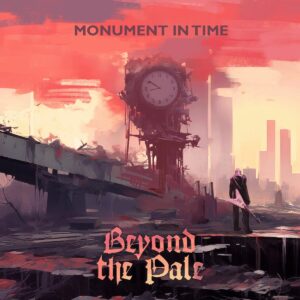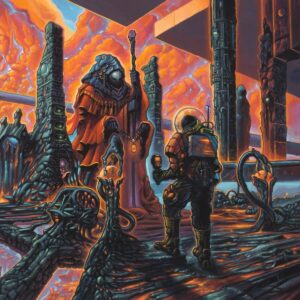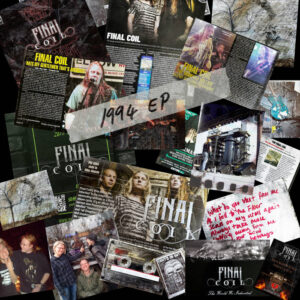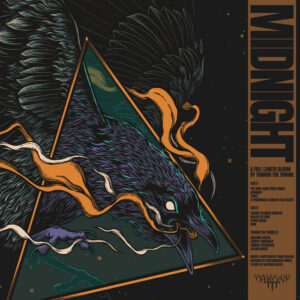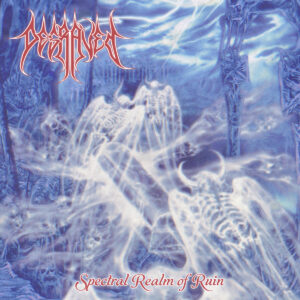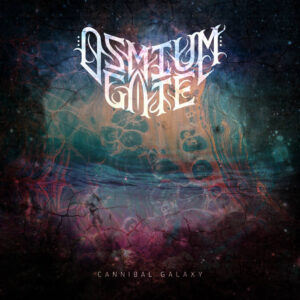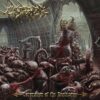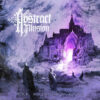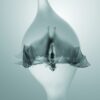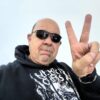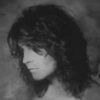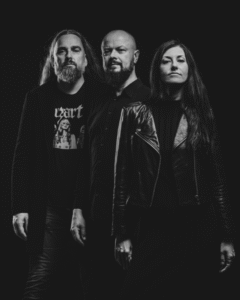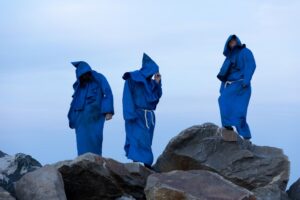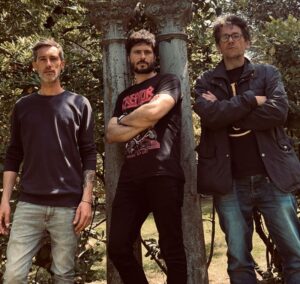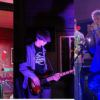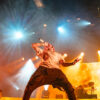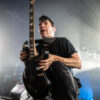Torham
The Book
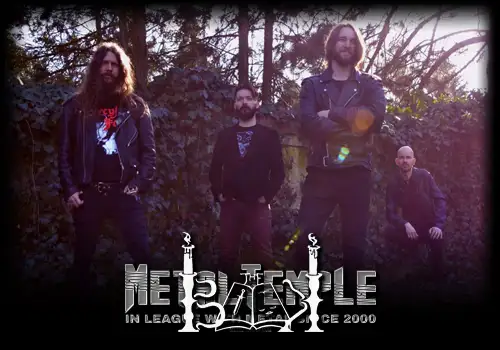
Hello Lior, thank you for the opportunity for this interview. I will try my best to answer your interesting questions. And how are things going? I'm enjoying, as Whitesnake might say, the best
years of my life!
Well, we started the band with a drummer Sarapis immediately after the break-up of our previous group Žrec. It was folk metal, where a lot of different arrangements were needed, like keyboards and folk instruments. I dare say that in the end we were very inclined to make the music rawer, so it was logical that after the end of the band we wanted to fulfill this desire immediately. That was in 2018. But we didn't want to limit ourselves to the boundaries of metal genres, so we simply played as we thought. However, since we have years of experience listening to more traditional metal bands, it naturally boiled into us in the form you had the opportunity to hear.
Interestingly, we initially chose the name Ophion to express more our primordial and mythological image, or rather the aura. During this phase, I had a dream of playing in a Greek amphitheatre at a metal festival. But somehow they forgot about us and the unknown band The Book performed instead. Next day, I went to other members and I immediately suggested renaming, but I failed. Out of nowhere, however, the band Ophion appeared in the metal underground with their debut album and label, while we didn't record anything. So after a short while we logically turned to the title The Book.
Since I started listening to music on Black Sabbath, their riffing and atmosphere are still holding me very tight. I feel similar vibes from old Slayer albums or even Rotting Christ demos. In general, Greek black metal absorbed a lot of heavy metal elements, which constantly inspires me. The lyrics of such bands speak of dark occult rituals, but somehow I feel the presence of that ancient European culture in their music. In the band, we are also fans of 70's hard rock and prog rock music.
And often in interviews I forget about an important band for me. It's Celtic Frost. You can hear some totally CF inspired riffs on Sacrificer or Ancient steel. A few people also hear the Czech Legend Root or the traditional NWOBHM Angel Witch in us, which is of course an honour and inspiration for us for future recordings.
As one wise person would say: Satan. No, I'm just kidding because I've never felt like a Satanist. I think that form of magic is a kind of natural organicity. 80s Metal has no computer tricks, no plasticity. Just raw art, raw power that drives you forward. Which can be both very dark and very epic. And I feel in old bands a lot of insanity and possession in a good way. No fundamentalism, just expression of free will.
Personally, I think that when the pandemic closed us at home, we had plenty of time to use our creativity and think about the band more deeply. Especially me. For example, when writing lyrics, I need to completely immerse myself. Of course, we took care of our health, and if someone felt sick, we didn't risk anything and just cancelled the rehearsals or recordings. But when everyone was fine, we fucked all these restrictions. So I think during this pandemic bullshit we stayed strong in our minds.
We have good reviews mostly on German webzines, we were also played by radio in Australia, our friends like the record very much, so we are more than satisfied. But this is just the beginning, and there are a lot of steps to do.
The title came from one verse in the last song Master of the dawn: "By the altar - forgotten art of old - the young poet stood unshaken and bold." Here, the story explicitly states that it is an ancient sacred place used for rituals. We actually see a similar thing on the cover of the record. Four stone statues stand by a dilapidated majestic portal into which the blood-red sun (or moon, if you want) enters. Through this symbolism, the name secretly expresses that we are looking for a kind of mythical golden age in which man fulfilled his divine essence. Gradually, by involution, man lost this essence and we are trying to transform ourselves to get this essence back. You mentioned the Golden age of the metal genre which is also a great metaphor for all of this. Because we are also seeking for a great old metal sound and majestic atmosphere of the past where metal was a pure lifestyle.
A very delicate question. It is about finding a way (or walking a path) to transform yourself. I will give you an example. Song Ancient steel is about a ritual where blood and sacred metals are melted together to fill your heart with whatever you want, but in this case it's a passion for metal music which is metaphorically formed into some sort of weapon, Excalibur, Orcrist, Spear of destiny etc. And you have to sacrifice a lot in your life to fulfil all of this.
For me, this way and transformation can be the creation of music, writing lyrics and playing concerts. 3 different activities or disciplines. I admit that their mastery is out of reach for me and it's still forging. But that's challenging and cathartic at the same time.
Like any music, this album aims to invite and keep you present while listening. Therefore, even the lyrics are full of universal symbols that should mentally enrich a person. I don't know if this will help anyone in the fight for life and death, for example. However, ads, corporations or consumption will not help in this fight at all. The affair is, therefore, a person's own path, own exception of free will and soulfulness as a revolt against the modern world.
It's simple. We like a lot of metal genres and therefore we don't want to stay with just one. At such a phase, the music often turns to the complicated avant-garde, while we want to play what we like, what is good to listen to, and what we are happy to return to. Best of all, it came naturally. We didn't have to say things like: "Now it needs something more heavy metal, because the rest sounds too thrash metal."
Usually I come up with basic riffs and we put them together in the rehearsal room. The drummer is already inventing his parts, just like the bassist. We usually record the process on a Dictaphone so that we can think about it at home. In the meantime, an idea comes to my mind as to what the song might be about, and with that come the first verses. But sometimes the opposite is true. The lyrics also come with melodies and phrasing of the singing, which the singer then adjusts to his liking. Well, nothing special, we just do it like most bands in the world. Except the Dictaphone.
For me personally, it was the creation of an atmosphere of those extinct teachings and ancient mythical worlds naturally combined with the so-called old school metal. But as is common in the creative process, not everything is as one thinks. Despite our readiness, a lot of things were created in the studio, which changed a lot of details.
I love traditional doom metal, so not putting its elements on the album would be a sin. We can't stay with one genre, so riffs similar to the Celtic Frost style and the implementation of heavy metal harmonies seemed to us to be an excellent and actually quite obscure journey. We definitely want to develop this recipe in the future as well. For us Sacrificer is a very good song to play live. This is also proved by the fact that we want to release its rehearsal version as a bonus for the MC release of our album.
Above all, we wanted to prove that doing a cover version is different than just taking someone else's song and playing it. I remember going on a hike somewhere and I came up with the construction of the song, which should start similarly to Manowar. That's how I think covers should be done. I mean not starting as Manowar but just take the base of the song and imprint a different face on it and not just copy a hundred times played. Of course, the lyrics of the song suited us conceptually. Again, it's about transformation of the individual.
Yes, this song is my favorite, because it listens well, but at the same time it was also a challenging playing experience for us. As I recall, we also composed it last, so we imprinted the most experience with previous songs. I remember playing the refrain melody at home and recorded a second parallel melody to it. I kept playing it around, and when I closed my eyes, I saw a vast landscape over which the sun rose. The phrasing of the words "master of the dawn" instilled in me, and I already knew that this song had to be about that, but at the time I had no idea what it could all mean.
We've been talking about darkness here, but so far I'm only talking about the light itself. In this vision, I perceived the light-bearing myth of Prometheus or Lucifer. But it depends on the point of view, what is the meaning of light and darkness for each one of us. All that remained was to come up with the rest of the riffs, which took place mainly in the rehearsal room. I remember we were a long way from the finals for a long time, but we felt so close to the finish. Because it was a challenge, everyone participated in it as a composer, and that strengthened us as a team.
I mainly learned that it works! I mean that I can compose and play riffs or solos that I never dreamed of before. The same about lyrics. In my life, I have not composed any lyrics in English nor symbolic and meaningful. Now I know that I can make it, even develop it and that The Book has moved me further in my possibilities. But all this could not be done in mental discomfort. So I have to thank all the current members of the band, with whom we function as perfect friends.
Sure, I'm happy to share the news. The album is of course at
the very beginning, but we already have one song ready for live performance. It's called Ophitic Vibrations. In addition, we brought our longtime friend and excellent guitarist Kubyk to the party, so we are looking forward to the sounds we get from this cooperation. The album will definitely be much darker (both musically and lyrically), as we have found that our singer enjoys more doom-like tones and can portray even epic-sounding "suffering". And we fully enjoy it.
Yes, we are planning concerts in the autumn, but so far only in the Czech Republic, specifically on 28.10. in Pilsen and 29.10. Brno. As the main star, we invited the German Lynx, whose album Watcher of skies is an instant classic. Unfortunately, we won't have time for summer festivals, and I really don't mind at the moment. We will rather focus on new songs.
Thanks again and all the best also for you Lior and for Metal Temple. Keep the metal hearts fulfilled.

More results...

